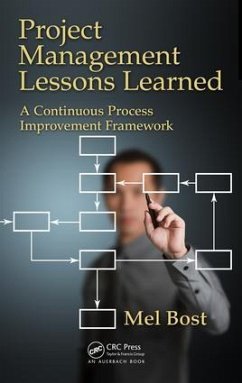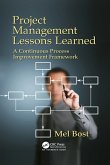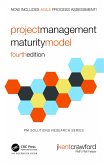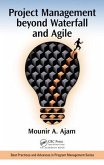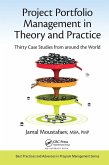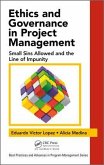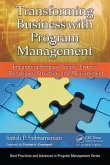- Gebundenes Buch
- Merkliste
- Auf die Merkliste
- Bewerten Bewerten
- Teilen
- Produkt teilen
- Produkterinnerung
- Produkterinnerung
This book covers the important role a project management office (PMO) plays in promoting lessons learned. Project managers learn how to improve processes by applying lessons learned. The book emphasizes "actionability," or producing a process improvement that can be acted upon by anyone in the PMO or project team.
Andere Kunden interessierten sich auch für
![Project Management Lessons Learned Project Management Lessons Learned]() Mel BostProject Management Lessons Learned63,99 €
Mel BostProject Management Lessons Learned63,99 €![Project Management Maturity Model Project Management Maturity Model]() J Kent CrawfordProject Management Maturity Model102,99 €
J Kent CrawfordProject Management Maturity Model102,99 €![Project Management beyond Waterfall and Agile Project Management beyond Waterfall and Agile]() Mounir AjamProject Management beyond Waterfall and Agile163,99 €
Mounir AjamProject Management beyond Waterfall and Agile163,99 €![Project Portfolio Management in Theory and Practice Project Portfolio Management in Theory and Practice]() Jamal MoustafaevProject Portfolio Management in Theory and Practice135,99 €
Jamal MoustafaevProject Portfolio Management in Theory and Practice135,99 €![Ethics and Governance in Project Management Ethics and Governance in Project Management]() Eduardo Victor LopezEthics and Governance in Project Management92,99 €
Eduardo Victor LopezEthics and Governance in Project Management92,99 €![Rethinking Project Management for a Dynamic and Digital World Rethinking Project Management for a Dynamic and Digital World]() Rethinking Project Management for a Dynamic and Digital World135,99 €
Rethinking Project Management for a Dynamic and Digital World135,99 €![Transforming Business with Program Management Transforming Business with Program Management]() Satish P SubramanianTransforming Business with Program Management144,99 €
Satish P SubramanianTransforming Business with Program Management144,99 €-
-
-
This book covers the important role a project management office (PMO) plays in promoting lessons learned. Project managers learn how to improve processes by applying lessons learned. The book emphasizes "actionability," or producing a process improvement that can be acted upon by anyone in the PMO or project team.
Produktdetails
- Produktdetails
- Verlag: Taylor & Francis Ltd (Sales)
- Seitenzahl: 207
- Erscheinungstermin: 18. Juni 2018
- Englisch
- Abmessung: 239mm x 163mm x 20mm
- Gewicht: 517g
- ISBN-13: 9781498747776
- ISBN-10: 1498747779
- Artikelnr.: 51797467
- Herstellerkennzeichnung
- Libri GmbH
- Europaallee 1
- 36244 Bad Hersfeld
- gpsr@libri.de
- Verlag: Taylor & Francis Ltd (Sales)
- Seitenzahl: 207
- Erscheinungstermin: 18. Juni 2018
- Englisch
- Abmessung: 239mm x 163mm x 20mm
- Gewicht: 517g
- ISBN-13: 9781498747776
- ISBN-10: 1498747779
- Artikelnr.: 51797467
- Herstellerkennzeichnung
- Libri GmbH
- Europaallee 1
- 36244 Bad Hersfeld
- gpsr@libri.de
Mel Bost is a project management consultant specializing in project lessons learned and best practices. He is currently teaching "project management for research" to digital humanities research students at Arizona State University. Previously he was a PMO Practice Leader with BOT International. He has conducted lessons learned training in Dubai and in Panama for the Canal Expansion Project. For over 35 years, Mr. Bost managed major projects for companies Ford Motor Company, Atlantic Richfield (ARCO), UNOCAL, and ConocoPhillips. Mr. Bost completed his BS Physics/MS Engineering degrees at Georgia Tech and his MS Engineering Science and MBA degrees at The University of Michigan, Ann Arbor.
1. Introduction to Processes and Projects as Key Facilitators of Modern
Life
2. Understanding and Empowering the Program Management Office (PMO) and Its
Influence on Project Lessons Learned
3. What Do I Do If My PMO Can't Execute?
4. Avoiding Disruption of the PMO by Accidental Adversaries
5. Identifying and Applying Lessons Learned
6. What Is "Leverage" and How Can Project Managers Use It to Their
Advantage?
7. The Importance of Reflection and Changing Attitudes in Lessons Learned
8. The Best Time to Document Project Lessons Learned
9. The Actual Cost to Your PMO for Not Capturing and Sharing Project
Lessons Learned
10. Applying Project Lessons Learned as a Best Practice for Your
Organization
11. Understanding and Using the New Project Framework
12. Recognizing and Using Different Perspectives
13. Dilemmas and Choices Faced by Project Managers
14. Identifying Valuable Candidates for Project Lessons Learned
15. Using the Project Framework to the Benefit of Enterprise Risk
Management
16. The Tremendous Impact of Role Models on Project Management Leadership
17. Facilitating a Closer Connection: Lessons Learned, Risk Management, and
Knowledge Management
18. Using the Project Framework to Facilitate Technology Development in
Projects
19. Using Facilitation and Reframing toward Project Process Improvement
20. Avoiding Traps Where Structure Influences Behavior
21. Lessons Learned from the Application of Organizational Dynamics to the
Business Continuation and Emergency Response Environment
22. The Sustainability Imperative
23. Conclusions
24. Summary
Appendix 1. Project Lessons Learned Template
Appendix 2. A Layman's Guide to Reinforcing and Balancing Loop Behavior and
the Resulting Systems Archetypes
Appendix. 3 Systems Thinking and Organizational Dynamics Example-Teen
Drivers
Appendix 4. Project Lessons Learned from the Panama Canal Experiences
Appendix 5. Capability Maturity Model Background and Levels of Maturity
Appendix 6. Research as a Major Process
Appendix 7. Scenarios Where Lessons Learned Can Positively Impact
Performance and Outcomes
Epilogue
Glossary
References
Life
2. Understanding and Empowering the Program Management Office (PMO) and Its
Influence on Project Lessons Learned
3. What Do I Do If My PMO Can't Execute?
4. Avoiding Disruption of the PMO by Accidental Adversaries
5. Identifying and Applying Lessons Learned
6. What Is "Leverage" and How Can Project Managers Use It to Their
Advantage?
7. The Importance of Reflection and Changing Attitudes in Lessons Learned
8. The Best Time to Document Project Lessons Learned
9. The Actual Cost to Your PMO for Not Capturing and Sharing Project
Lessons Learned
10. Applying Project Lessons Learned as a Best Practice for Your
Organization
11. Understanding and Using the New Project Framework
12. Recognizing and Using Different Perspectives
13. Dilemmas and Choices Faced by Project Managers
14. Identifying Valuable Candidates for Project Lessons Learned
15. Using the Project Framework to the Benefit of Enterprise Risk
Management
16. The Tremendous Impact of Role Models on Project Management Leadership
17. Facilitating a Closer Connection: Lessons Learned, Risk Management, and
Knowledge Management
18. Using the Project Framework to Facilitate Technology Development in
Projects
19. Using Facilitation and Reframing toward Project Process Improvement
20. Avoiding Traps Where Structure Influences Behavior
21. Lessons Learned from the Application of Organizational Dynamics to the
Business Continuation and Emergency Response Environment
22. The Sustainability Imperative
23. Conclusions
24. Summary
Appendix 1. Project Lessons Learned Template
Appendix 2. A Layman's Guide to Reinforcing and Balancing Loop Behavior and
the Resulting Systems Archetypes
Appendix. 3 Systems Thinking and Organizational Dynamics Example-Teen
Drivers
Appendix 4. Project Lessons Learned from the Panama Canal Experiences
Appendix 5. Capability Maturity Model Background and Levels of Maturity
Appendix 6. Research as a Major Process
Appendix 7. Scenarios Where Lessons Learned Can Positively Impact
Performance and Outcomes
Epilogue
Glossary
References
1. Introduction to Processes and Projects as Key Facilitators of Modern
Life
2. Understanding and Empowering the Program Management Office (PMO) and Its
Influence on Project Lessons Learned
3. What Do I Do If My PMO Can't Execute?
4. Avoiding Disruption of the PMO by Accidental Adversaries
5. Identifying and Applying Lessons Learned
6. What Is "Leverage" and How Can Project Managers Use It to Their
Advantage?
7. The Importance of Reflection and Changing Attitudes in Lessons Learned
8. The Best Time to Document Project Lessons Learned
9. The Actual Cost to Your PMO for Not Capturing and Sharing Project
Lessons Learned
10. Applying Project Lessons Learned as a Best Practice for Your
Organization
11. Understanding and Using the New Project Framework
12. Recognizing and Using Different Perspectives
13. Dilemmas and Choices Faced by Project Managers
14. Identifying Valuable Candidates for Project Lessons Learned
15. Using the Project Framework to the Benefit of Enterprise Risk
Management
16. The Tremendous Impact of Role Models on Project Management Leadership
17. Facilitating a Closer Connection: Lessons Learned, Risk Management, and
Knowledge Management
18. Using the Project Framework to Facilitate Technology Development in
Projects
19. Using Facilitation and Reframing toward Project Process Improvement
20. Avoiding Traps Where Structure Influences Behavior
21. Lessons Learned from the Application of Organizational Dynamics to the
Business Continuation and Emergency Response Environment
22. The Sustainability Imperative
23. Conclusions
24. Summary
Appendix 1. Project Lessons Learned Template
Appendix 2. A Layman's Guide to Reinforcing and Balancing Loop Behavior and
the Resulting Systems Archetypes
Appendix. 3 Systems Thinking and Organizational Dynamics Example-Teen
Drivers
Appendix 4. Project Lessons Learned from the Panama Canal Experiences
Appendix 5. Capability Maturity Model Background and Levels of Maturity
Appendix 6. Research as a Major Process
Appendix 7. Scenarios Where Lessons Learned Can Positively Impact
Performance and Outcomes
Epilogue
Glossary
References
Life
2. Understanding and Empowering the Program Management Office (PMO) and Its
Influence on Project Lessons Learned
3. What Do I Do If My PMO Can't Execute?
4. Avoiding Disruption of the PMO by Accidental Adversaries
5. Identifying and Applying Lessons Learned
6. What Is "Leverage" and How Can Project Managers Use It to Their
Advantage?
7. The Importance of Reflection and Changing Attitudes in Lessons Learned
8. The Best Time to Document Project Lessons Learned
9. The Actual Cost to Your PMO for Not Capturing and Sharing Project
Lessons Learned
10. Applying Project Lessons Learned as a Best Practice for Your
Organization
11. Understanding and Using the New Project Framework
12. Recognizing and Using Different Perspectives
13. Dilemmas and Choices Faced by Project Managers
14. Identifying Valuable Candidates for Project Lessons Learned
15. Using the Project Framework to the Benefit of Enterprise Risk
Management
16. The Tremendous Impact of Role Models on Project Management Leadership
17. Facilitating a Closer Connection: Lessons Learned, Risk Management, and
Knowledge Management
18. Using the Project Framework to Facilitate Technology Development in
Projects
19. Using Facilitation and Reframing toward Project Process Improvement
20. Avoiding Traps Where Structure Influences Behavior
21. Lessons Learned from the Application of Organizational Dynamics to the
Business Continuation and Emergency Response Environment
22. The Sustainability Imperative
23. Conclusions
24. Summary
Appendix 1. Project Lessons Learned Template
Appendix 2. A Layman's Guide to Reinforcing and Balancing Loop Behavior and
the Resulting Systems Archetypes
Appendix. 3 Systems Thinking and Organizational Dynamics Example-Teen
Drivers
Appendix 4. Project Lessons Learned from the Panama Canal Experiences
Appendix 5. Capability Maturity Model Background and Levels of Maturity
Appendix 6. Research as a Major Process
Appendix 7. Scenarios Where Lessons Learned Can Positively Impact
Performance and Outcomes
Epilogue
Glossary
References

